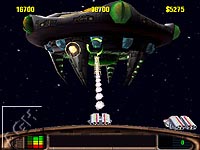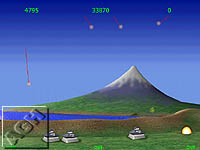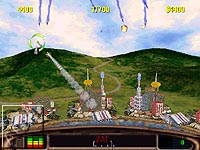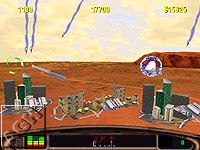The revitalized Atari goes to the well again and updates one of
its most famous classics, Missile Command, for
Windows PCs. One of the greats in both the arcades and on the
2600 and 5200 consoles, just about everyone who was into gaming
in the early 80's was exposed to this incredibly simple yet
tirelessly addicting game.
For most of the late 1970's and early 80's, space shooting games
dominated the arcade landscape which began with Space
Invaders. While most of them were slide-and-shoot
contests similar to Space Invaders (Galaxian, Galaga,
Moon Cresta, Phoenix), Missile Command was unique
in both its presentation and gameplay.
The object of this updated version of Missile Command is simple
and still the same. Your planet is being attacked by alien forces
who are out to destroy and seize the planet. In preparing for the
invasion, Earth has built a powerful defense system. Several
antiballistic missile (ABM) bases have been created, and it's your
responsibility as base commander to protect and defend the cities.
The enemy begins by firing interplanetary ballistic missiles
which are aimed to destroy your cities and missile base, and it's
your task to stop the enemy before your happy and harmonious
planet is destroyed.
The enemy attacks in a series of waves, with each consecutive wave
being faster than the one before it. You cannot fire away at
will like in most other shooters -- you only have a set amount
of ABM's at your disposal, and if you run out of them at the
end of a wave, you're out of luck! To make matters worse, you
also need to protect your three launching missile bases from enemy
fire. Once a base is hit, all of its contents are destroyed.
In the PC version, you use your mouse as a target control for your
ABMs. You move the mouse around to move the on-screen cursor to the
place where you want your ABMs to explode. The "A" key on your
keyboard fires missiles from the left base, with the "S" and "L"
keys launching them from the center and right bases, respectively.
The freshened-up version of Missile Command gives you a choice
between Classic Mode and Ultimate Mode. As you'd expect, the
Classic Mode gives you the privilege of experience an accurate
version of the the arcade original. The graphics have been
slightly upgraded, but the game itself is identical to the
classic. In addition, it also offers head-to-head and
cooperative play modes.
The Ultimate Mode is the full-blown, 3D rendition that adds
new play action, weapons, enemies and bosses. The playfield
has also been altered in that the entire action no longer
takes place on a single screen. Because a lot of activity
is happening outside of the main viewing area, you'll be
constantly relying on the radar (a-la Defender)
to keep a tab on where all the missiles are coming from.
Finally, you're not saddled with the same 'ol ABMs for long...
you have the ability to get better weapons as you progress
in the game. You'll need them too, because the enemies also
get correspondingly smarter, faster and more deadly.

|
Graphically, while the modern remake certainly eclipses that of
the original 1980 edition, it doesn't exactly measure up to
some of the better 3D accelerated PC games of late. The level
of detail won't blow any Quake player away, but then again,
best sellers like Roller Coaster Tycoon don't have cutting-edge
visuals, either. Similarly, the sound effects and music are
run-of-the mill, although the inclusion of most of the original's
sound samples is a big plus in the eyes of this classic gaming
enthusiast.
As far as gameplay goes, there's a lot going for it. I use
a Kensington Trackball Mouse as the controller of choice, and
it played beautifully. I would expect that using a mouse would
not in any way detract from quick and precise cursor control,
either. As in the company's remake of Pong,
Atari has done a clever job of adding in some very cool boss
stages that tie-in nicely to the play mechanics of the regular
levels. They're quite difficult, too!
All in all, Missile Command is yet another update done right,
and is good enough to stand on its own without having to rely
on its namesake to draw attention of modern game players. It's
easy to learn and addicting, and now, by virtue of the numerous
enhancements to the game, you can add another vocabulary to
Missile Command -- deep.
|
Title |
Missile Command |
|
Publisher |
Atari |
|
System |
PC |
|
Graphics |
6 |
|
Sound |
7 |
|
Gameplay |
8 |
|
Overall |
8 |
|
Reviewer |
Keita Iida |




